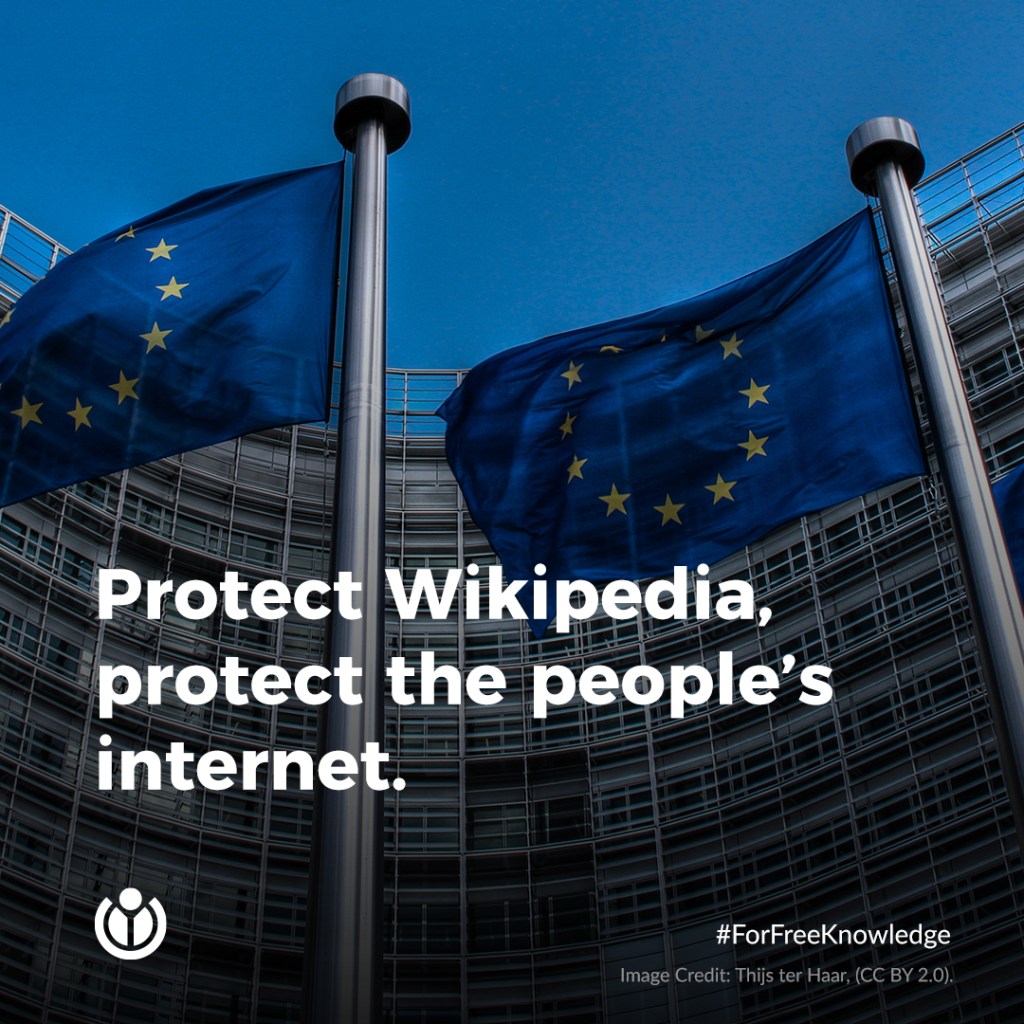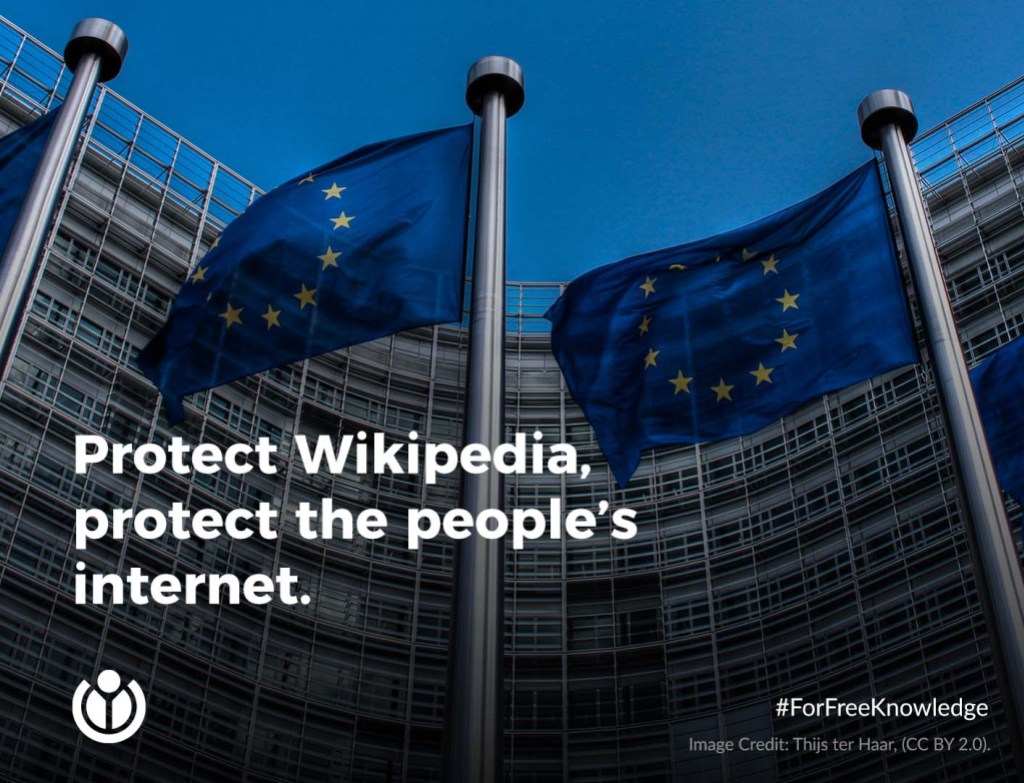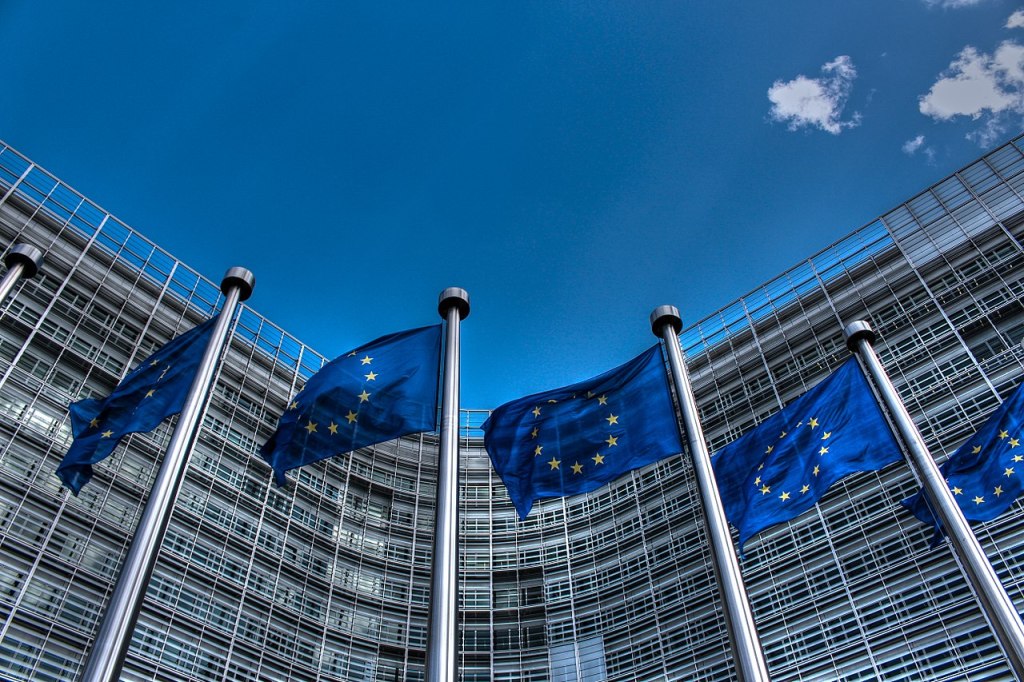In the coming weeks, the European Parliament is expected to vote on amendments to the draft proposal for the Digital Services Act (DSA). The DSA is a large piece of regulation designed to address the spread of illegal content on Big Tech platforms.
The Wikimedia Foundation Public Policy team, alongside several Wikimedians and affiliates in the European Union, have been closely following the discussions surrounding the DSA and its potential impact on Wikimedia projects. We applaud European policymakers’ efforts to make content moderation more accountable and transparent. However, some of the DSA’s current provisions and proposed amendments also include requirements that could put Wikimedia’s collaborative and not-for-profit model at risk.
We are advocating for changes to the DSA that better account for the way the Wikimedia projects operate. Through the rest of November, we will be sharing our position on the DSA on social media, through media outreach, and through our own channels.
Keep reading to understand our position and learn how to get involved.
The Wikimedia Foundation’s position on the DSA
We appreciate the intent of the DSA to introduce more accountability and transparency into online content moderation. Yet, we have some serious reservations about the current draft proposal. The draft provisions (the actual language of the proposed law), and many amendments (the suggested changes to the original proposed law) that have been floated, are designed for the operating models of major technology platforms. Those platforms typically use centralized content moderation systems, run by the platforms themselves, where users have very limited ability to participate in decisions about content or policies on the platforms. Open platforms with decentralized models of decision-making, such as Wikipedia, will likely be negatively affected by the current provisions. Here is what concerns us most:
- Prescriptive requirements for how terms of service should be enforced might work for Big Tech platforms with top-down models of governance that determine the policies for content and conduct, but they won’t work for Wikimedia projects. Take Wikipedia as an example, which distinguishes terms of service from community-developed policies. Most rules on Wikipedia are created and maintained by volunteers. As they enforce their own policies, they take the context and origin of all content appropriately into account. The DSA should protect and promote spaces on the web that allow for such collaborative governance, where a host of a platform and a community of users share responsibilities and power, and develop and enforce their own set of rules appropriately.
- Strict deadlines for removing illegal content do not take into account the community-led content moderation process of the Wikimedia projects. Removing content is a delicate process that needs to include humans, consider context, and allow sufficient time to evaluate the content. Present DSA provisions incentivize the use of automated filters to flag content and encourage platforms to over-remove content. The result would be a regulation that gives more power to platforms and less power to the people who use them.
You can find more information about our position on the DSA in this post on the Wikimedia Foundation website.
How you can get involved
Our policy team and EU affiliate staff are educating policymakers and the public about our concerns and a positive vision for the internet; social media attention helps strengthen the message. It shows policymakers that our movement cares about this issue, pushing them to consider our perspective leading up to the vote on the DSA.
If you are interested in amplifying our message on social media, there are several things you can do:
- Follow the Wikimedia Foundation on Twitter, Facebook, Instagram, and LinkedIn, and @WikimediaPolicy on Twitter and share our messages
- Share the following messages and graphics on your social media channels. Be sure to use the hashtag #ForFreeKnowledge, tag the Foundation accounts (@WikimediaPolicy and @Wikimedia), and include a link to this news post. Feel free to adapt the messages for your own voice.
Sample social media posts:
We can create an internet that holds large tech platforms accountable while protecting community-governed projects like @Wikipedia.
Join me to call on European lawmakers to ensure the Digital Services Act protects the people’s internet. #ForFreeKnowledge https://wikimediafoundation.org/dsa-news
#ICYMI: The @Wikimedia movement is calling on European lawmakers to ensure the Digital Services Act protects and promotes a diverse and thriving online ecosystem.
Together, we can bring the internet beyond #BigTech. #ForFreeKnowledge https://wikimediafoundation.org/dsa-news
The Digital Services Act should not take a one-size-fits-all approach to internet regulation. Projects like @Wikipedia show there is more to the internet than Big Tech platforms.
That is why I am asking European lawmakers to protect the people’s internet. https://wikimediafoundation.org/dsa-news
As European lawmakers debate the #DigitalServicesAct, they should consider how new rules can make people-powered platforms like @Wikipedia the standard, not the exception.
Help protect the people’s internet! #ForFreeKnowledge https://wikimediafoundation.org/dsa-news
When lawmakers try to regulate the internet with a one-size-fits-all approach.
🚩🚩🚩🚩🚩🚩🚩🚩🚩🚩
It is time to demand that lawmakers protect the people’s internet. #ForFreeKnowledge #DigitalServicesAct @Wikimedia https://wikimediafoundation.org/dsa-news
The Digital Services Act should not take a one-size-fits-all approach to internet regulation. People-powered projects like @Wikipedia show there is more to the internet than Big Tech platforms run by corporations.
That is why I am asking European lawmakers to protect the people’s internet. https://wikimediafoundation.org/dsa-news
We can create an internet that holds large tech platforms accountable while protecting nonprofit, community-governed, public interest projects like @Wikipedia.
Join me to call on European lawmakers to ensure the Digital Services Act protects the people’s internet. ⬇️ #ForFreeKnowledge https://wikimediafoundation.org/dsa-news
The Wikimedia movement is calling on European lawmakers to ensure the Digital Services Act protects and promotes a diverse and thriving online ecosystem.
Together, we can bring the internet beyond Big Tech. #ForFreeKnowledge https://wikimediafoundation.org/dsa-news
As European lawmakers debate the #DigitalServicesAct, they should consider how new rules can make people-powered platforms like @Wikipedia the standard, not the exception.
Help protect the people’s internet! https://wikimediafoundation.org/dsa-news
When lawmakers try to regulate the internet with a one-size-fits-all approach.
🚩🚩🚩🚩🚩🚩🚩🚩🚩🚩
It is time to demand that lawmakers protect the people’s internet. https://wikimediafoundation.org/dsa-news
We can create an internet that holds large tech platforms accountable while protecting nonprofit, community-governed, public interest projects like @Wikipedia.
Join me to call on European lawmakers to ensure the Digital Services Act protects the people’s internet.
Visit wikimediafoundation.org/dsa-news to learn more.
#ForFreeKnowledge #DigitalServicesAct #Wikipedia
#ICYMI: The Wikimedia movement is calling on European lawmakers to ensure the Digital Services Act protects and promotes a diverse and thriving online ecosystem.
Together, we can bring the internet beyond #BigTech.
Visit wikimediafoundation.org/dsa-news to learn more about the DSA.
#ForFreeKnowledge #DigitalServicesAct #Wikipedia
The #DigitalServicesAct should not take a one-size-fits-all approach to internet regulation.
People-powered projects like @Wikipedia show there is more to the internet than #BigTech platforms run by corporations.
That is why I am asking European lawmakers to protect the people’s internet.
Visit wikimediafoundation.org/dsa-news to learn more.
#ForFreeKnowledge #Wikipedia
When lawmakers try to regulate the internet with a one-size-fits-all approach.
🚩🚩🚩🚩🚩🚩🚩🚩🚩🚩
It is time to demand that lawmakers protect the people’s internet.
Visit wikimediafoundation.org/dsa-news to learn more.
#ForFreeKnowledge #DigitalServicesAct #Wikipedia
The Digital Services Act should not take a one-size-fits-all approach to internet regulation. People-powered projects like Wikipedia show there is more to the internet than Big Tech platforms run by corporations.
That is why I am asking European lawmakers to protect the people’s internet.
Learn more: https://wikimediafoundation.org/dsa-news#ForFreeKnowledge #DigitalServicesAct #Wikipedia
The wikimedia-foundation is teaming up with advocates to call on European lawmakers to ensure the #DigitalServicesAct protects and promotes a diverse and thriving online ecosystem.
Together, we can bring the internet beyond Big Tech. https://wikimediafoundation.org/dsa-news
When lawmakers try to regulate the internet with a one-size-fits-all approach.
🚩🚩🚩🚩🚩🚩🚩🚩🚩🚩
It is time to demand that lawmakers protect the people’s internet. https://wikimediafoundation.org/dsa-news
Social media graphics
Facebook/Instagram/LinkedIn-sized graphic

Twitter-sized graphic


Can you help us translate this article?
In order for this article to reach as many people as possible we would like your help. Can you translate this article to get the message out?
Start translation
